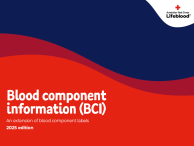Don’t have an account?
Select the donation type you’d like to make
Clinicians are encouraged to adopt the principles of patient blood management (PBM) and related evidence-based guidelines to determine the appropriateness of transfusion.
PBM is a coordinated healthcare approach to patient care that focuses on strategies to reduce or avoid the need for a blood transfusion where possible, alongside the appropriate use of blood.
General principles of blood component therapy include:
- Transfusion can replace or supplement specific blood components that are either deficient or not functioning properly.
- The decision to transfuse should:
- be based on thorough clinical assessment of the patient and their individual needs
- be based on an appropriate clinical and laboratory diagnosis
- consider transfusion alternatives
- consider the risks and benefits to the patient, and
- consider the availability, cost, and the importance of appropriately using a valuable community resource.
- Transfusion therapy can provide short or long-term support.
Informed consent should be obtained and documented for all transfusions of blood components in accordance with national Blood Management Standards and guidelines, and local institutional informed consent policies.
Updated April 2025
Further information
External resources


